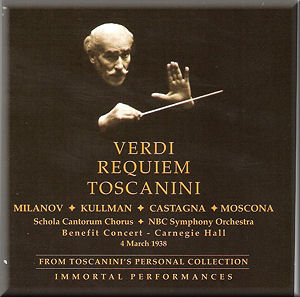 |
 |
|

Availability
Immortal
Performances |
Giuseppe VERDI (1813-1901)
Requiem (1874) [86:15]
All-Verdi complete concert:
NBC Symphony Orchestra – 31 January 1943
La Forza del Destino – overture [6:55]
Nabucco – Act III Chorus of Slaves [5:10]: Westminster Choir
I Lombardi Act III Prelude [4:41]: I Lombardi Trio
Qui posa il fianco (Vivian della Chiesa (soprano): Jan Peerce (tenor), Nicola Moscona (bass)) [8:54]
La Traviata, Prelude to Act III [3;40]
Otello, Act III, Ballabili (Ballet Music) [6:15]
Hymn of the Nations (American premiere) [2:52]
Hymn Spettacolo sublime (Jan Peerce (tenor)) [12:30]
includes commentaries
 Zinka Milanov (soprano); Charles Kullman (tenor); Bruna Castagna (contralto); Nicola Moscona (bass)
Zinka Milanov (soprano); Charles Kullman (tenor); Bruna Castagna (contralto); Nicola Moscona (bass)
Chorus of the Schola Cantorum;
NBC Symphony Orchestra/Arturo Toscanini
rec. 4 March 1938, live, Carnegie Hall, NYC (Requiem); 31 January 1943 (concert)
 IMMORTAL PERFORMANCES IPRMS IPCD1009-2 [61:53 + 79:05]
IMMORTAL PERFORMANCES IPRMS IPCD1009-2 [61:53 + 79:05] 
|
|
|
The history of Toscanini’s Verdi Requiem on disc is something
of a study in frustration. The best sonics preserve the January
1951 broadcast, but here one finds that the conductor tends
to rush tempi, sometimes uncomfortably so. His November 1940
broadcast is more sympathetic in this respect, though sometimes
even here there is a slight tendency to push things. The La
Scala performance of 1950, not heard by me, has also been issued,
but the most convincing of all are the two 1938 broadcasts;
the 27 May BBC and the 4 March NBC, the latter being the one
presented by Immortal Performances in this two disc set. As
with the BBC performance, now transferred by Paul Baily on Testament
SBT21362, a considerable amount of hard work has been necessary
with regard to the NBC lacquers to produce an artefact unafflicted
by the distortion and telephone wire crosstalk that were present
during its preservation. One authority, Mortimer Frank, discographic
Boswell to Toscanini’s Dr Johnson, pronounced the lacquers ‘virtually
incomprehensible’ when he listened to them. An Archipel release
has largely preserved these deficiencies.
Restoration has clearly been extensive. The ‘line leakage’ proved
especially difficult for a total of just over three minutes.
Here Richard Caniell has spliced from the 1940 and the London
performances. There was also the question of ‘turntable knocking’,
an infuriating occurrence to those of us who have experienced
it, and which Caniell nicely characterises as ‘loud honking’.
Some has had to be left, but I can assure listeners that whilst
it is necessarily audible, it is not at all devastating in its
impact. In the main it has been well tamed. The main line interference
occurs in Part I, and Part II is in general in somewhat better
sound anyway. I did notice the cross-talk – but the only time
it really bothered me was around 3:17 into the Oro supplex
et acclinis – and then only briefly. My view is that there’s
a limit to what restoration engineers can do to undo the ravages
of time and imperfect recording circumstances. And whilst it
would be wrong to pretend that examples of cross-talk and surface
noise do not intrude, I think it’s fair to add that this restoration
does what the Testament did with the BBC performance; it gives
us a major work of reclamation, painstakingly executed, and
intelligently resolved with regard to patching.
This would not matter quite so much were the performance not
so transcendent. Both it, however, and the BBC are equally worthy
of the highest merit. Certainly there is some muddiness in the
choral sound, especially in Part I, and a hint of overload in
the fortes (the Liber scriptus, for example) but
though the surface noise can increase in sound – as it does
during the Rex tremendae – the clarity and definition
of the instrumental contributions remains distinct. So, too,
the delicacy and refinement of the string moulding. In fact
the NBC strings here sound warmer than one can recall them,
and the winds and brass acquit themselves superbly. Of course
the singers are a fundamental component of the success of the
performance. Milanov and Moscona (actually in New York a late
substitute for Pinza) were also present at the Queen’s Hall,
London performance, where we also heard Thorborg and Rosvaenge,
and they are joined by Kullman and Bruna Castagna. All four
sing with concentrated focus, rhythmic surety and tonal excellence.
The companion performance is the all-Verdi concert of 31 January
1943, once again with the NBC. This consisted of operatic overtures
and preludes and vocal extracts, where the excellent singers
were Vivian della Chiesa, Jan Peerce and – once again - Nicola
Moscona. Highlights include the whole of the first scene of
Act II of I Lombardi, and the American premiere of Hymn
of the Nations. Va pensiero makes a wholly appropriate
choice for the depths of wartime. I assume that the extensive
and excellently played solo violin part in the Act III prelude
to I Lombardi is taken by Mischa Mischakoff.
Given the foregoing, collectors will be highly impressed by
the standard of care exercised by IP in this latest release.
Jonathan Woolf
|
|




 All Nimbus reviews
All Nimbus reviews








